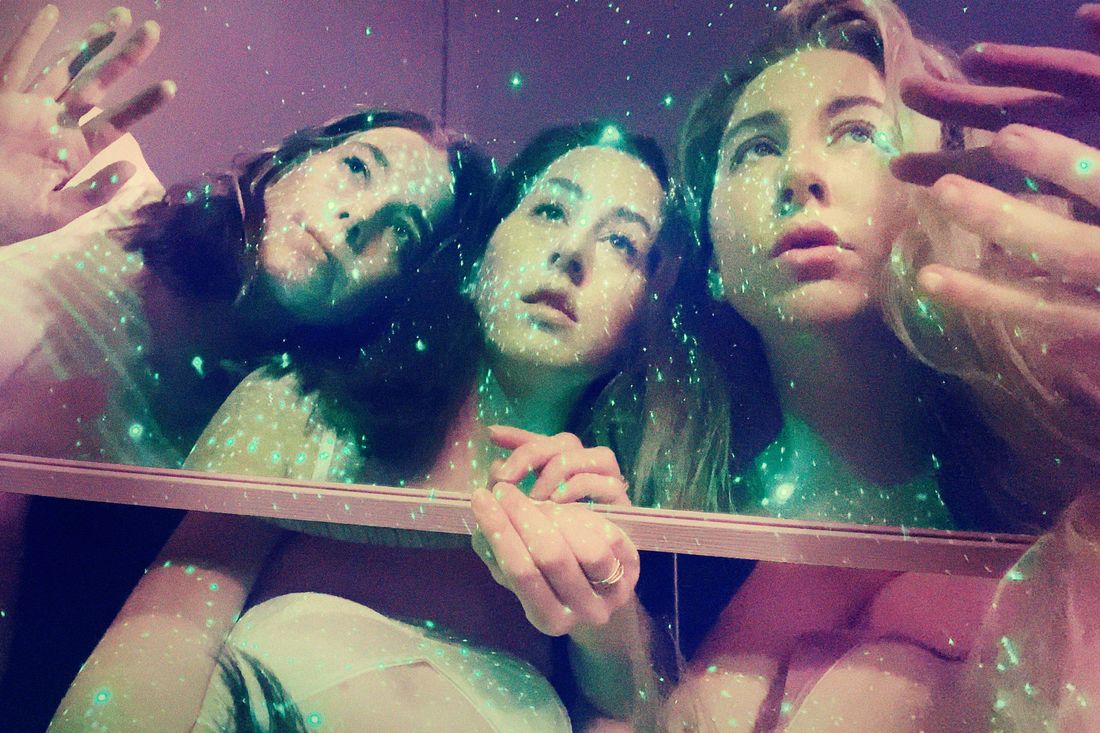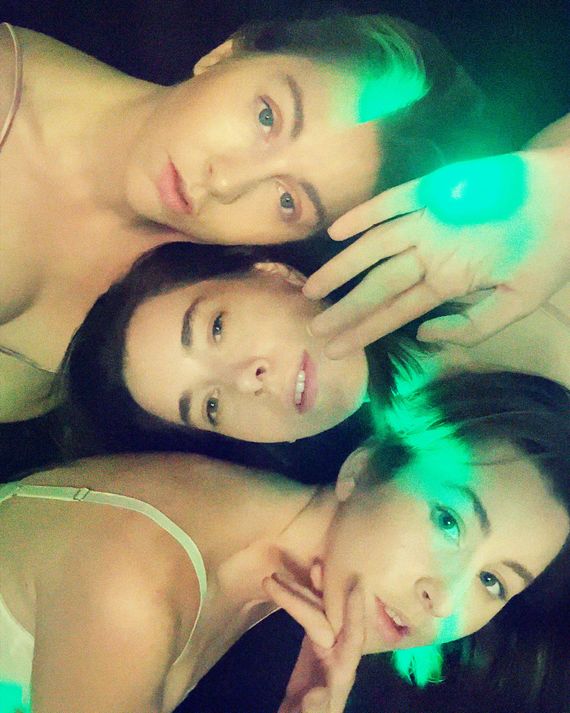
In June 2019, the members of Haim — sisters Este, 34, Danielle, 31, and Alana, 28 — had invited the director Paul Thomas Anderson to come by the studio to hear a demo of “Summer Girl,” a sweetly buoyant declaration of love. The song plays with the doo-doo-doos of Lou Reed’s “Walk on the Wild Side” but with a romantic breathiness; a saxophone meanders through the middle, sensuously. Ariel Rechtshaid, Danielle’s partner and the band’s producer, was diagnosed with cancer during the making of Haim’s second album, and “Summer Girl” was her way of conjuring a brighter future. The song didn’t have a bridge, and it still needed some tinkering, but Anderson insisted they shoot the music video that Saturday. “PTA was like, ‘We should shoot something for this like tomorrow,’ ” Alana recalls. “We were like, ‘Tomorrow?’ ‘Tomorrow.’ ”
The women weren’t thinking about releasing an album or putting out singles. They’d just wanted Anderson to hear a song they liked. He filmed the video over two days in the San Fernando Valley and Hollywood with one camera and no permits. A saxophonist follows the trio as they take off sweaters and winter coats, stripping down to brightly colored tops, denim cutoffs, and skirts. It was the fastest they’d ever worked on one song. There was a half-second of hesitation where they wondered whether it should be released so quickly. “We were like, ‘Let’s fucking put it out now!’ ” Alana continues. “We had zero plans for what was going to happen after that.” She adds matter-of-factly, “It’s summer and it’s called ‘Summer Girl.’ ”
We’re talking over Zoom, each Haim sister self-isolating in her respective home in Silver Lake. They’re all loose and chatty; Este and Alana cackle over the faulty connection on Danielle’s iPad, the way her face freezes with her mouth half-open mid-sentence. (“I can attest that you’re saying funny shit, but we can’t hear you!” Este tells her.) In less than a month, they’ll release the cheekily titled Women in Music Pt. III. (The name came to Danielle in a dream; all three liked the WIMPIII acronym.) The sisters, whose first EP debuted in February 2012, are defined by their throwback, pop-folk-rock style; WIMPIII is their strongest work yet. Every song on the album follows the ethos of “Summer Girl” — vulnerable but funky, tight but unstudied. Thematically, it’s Haim at its most exposed. These are songs about depression, sadness, grief, about wanting to get laid, about needing to leave a relationship but not feeling ready to. The album is an ideal match for any summer, but it hits differently during quarantine, when we’re all trying to recognize ourselves in our new lives indoors.
“Summer Girl” is the song that cracked the album open; two more singles — the solemn “Hallelujah” and the rumbling “Now I’m in It” — followed with a similar run-and-gun production. They made songs they liked and put them out. “Now I’m in It” was brought to them by their producer, the former Vampire Weekend member Rostam Batmanglij. He’d made the beat in 2014 at a Swedish writing camp. A few other writers had tried to crack the melody, but Danielle was the only one who could match the song’s momentum, even on the scratch vocals, which were just gibberish. They can write traditional pop as easily as they can write their own pop-rock hybrid, Batmanglij explains, but they choose to be themselves. “At the core, [their songwriting] is in the tradition of Fleetwood Mac,” he says.
By the time Haim released “Now I’m in It” this past October, it seemed like it was time to put together a proper album. “We had written, like, a bank of songs, not really knowing how they were gonna turn out,” Danielle says. (“Not like full songs though,” Alana notes. “They were just ideas.”) The initial plan was to pull together an album by winter, but the music seemed to summon warmer weather. They settled on a date in April — and then the coronavirus hit. “The label sent us something like, ‘Hey, can you post about this? Something promoting [the album].’ And it felt so fucking wrong,” Danielle remembers thinking. “Like, I don’t want to promote anything right now.” The band pushed the release to August, but by May, they just wanted it out. She continues, “The album itself was made with this feeling of like, Let’s just put shit on tape, so let’s just roll with it.” A week after our Zoom, the band found itself in a similar situation, doing promotion as the country erupts in protests against anti-black police brutality: “Releasing our album is not our main focus right now,” they said later over email. “We’re extremely angry at seeing innocent black people like George Floyd, Breonna Taylor, Ahmed Aubrey, Tony McDade and so many others being murdered at the hands of white supremacists and police, and we’re trying to help in any way that we can,” they continued. “We’ve been educating ourselves, calling politicians, donating, fundraising through our networks, protesting and urging our fans to do the same.” They’ve urged their fans to join them in calling for LAPD reform; they’ve called off their weekly quarantine dance sessions to protest.
WIMPIII was written during one of the trio’s lowest points emotionally. Working nonstop on their 2018 tour had left them with a lot of malaise. Este and Alana were concerned about Danielle, who was showing growing signs of depression. “I was in this fucking gnarly spiral,” she says. Adds Alana, “There was a point where I would look at Danielle and you could tell that like her energy source, her life behind her eyes, was just dim.” Danielle was afraid to pull her sisters down with her. Even as they talked about how to help her, Este and Alana were working out their own issues: Este is a diabetic, and touring had been hard on her body; her doctor told her she might need to find a new career. Alana was still grieving for her best friend, Sammi Kane Kraft, who died suddenly in 2012 at 20. “I’ve now noticed that I do this, and I hate it, but the second I start spiraling, I feel like I bring my sisters into my downward spiral ’cause we have similar brains,” Danielle says. “There was a lot of stuff that, collectively, we weren’t dealing with head-on,” adds Este. “A lot of the shit that we were going through since 2012. When we came back from tour, it hit us all, collectively, at the same time.”
Finally, Alana spoke up. She was their Cher in Moonstruck: Snap out of it! “Being a little sister, I feel like your job is to be the wrangler of the family,” she says. Alana conferred with Este, and the pair decided Danielle needed to get back into the studio to remind herself how happy writing could make her. It didn’t really matter what — whether it was a song or an album, how bad it was, how good it became. “We were just like, ‘Okay, let’s just go into the studio every day and try to write something,’ ” Danielle recalls. “ ‘It can be a line, it can be a verse, it could be a bridge, it could be an outro. Put it in your computer and come back tomorrow.’ ”
When they got into the studio, it felt cathartic to explore what they were dealing with, together and alone. “Summer Girl” was an experiment in pinpointing a specific source of pain, and it worked. Danielle calls it a “prophecy.” “At least for me,” she continues, “I always felt like, Here’s the song. Whoever listens to it should take it for however they hear it; they can apply the lyrics to whatever’s going on in their life. And with ‘Summer Girl,’ it was really freeing to let our fans know where we were coming from.”
Every song on the album is about something personal they hadn’t sung about before — none more so than “Hallelujah,” on which each sister gets a verse. Este sings about relying on her sisters as she struggles with diabetes; Alana sings about losing Kraft; Danielle sings about the blessing of being born between two angels, sisters who are able to buoy her spirits. Alana wrote her “Hallelujah” verse and broke into sobs during the taping. She tears up talking about it. “We had a demo of the song, and as soon as Este and Danielle sang their verses, it got to me, and I literally couldn’t get out the words,” she says. Her sisters start to cry too. “This is my first Zoom cry,” Alana says with a soft chuckle. All three are in therapy and speak plainly about their mental health. When Alana begins to cry, both sisters jump to action: Danielle zeroes in, asking if she wants to stop the interview; Este reminds her that she doesn’t need to apologize for getting emotional.
Despite the heavy subject matter, the tracks on Women in Music Pt. III coast along with a disarming lightness. Este called them “emotional bops,” songs about melancholy that demand you dance around your bedroom. “Do you say wimp or wimp-eeeee?,” I ask of the acronym for the album’s title. They answer in unison: the latter, with the long e. “When you say wimpy, you have to smile,” Alana says. “It’s like Cheeeeeese!”
*This article appears in the June 8, 2020, issue of New York Magazine. Subscribe Now!



